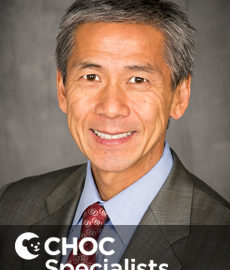
All posts by CHOC Childrens

Neurology
The CHOC Specialists Neurology Specialty Division at CHOC Children’s is available for consultation 24-hours-a-day, 7 days a week and provides diagnostic services, medical treatment, and follow-up care to infants, children, and adolescents who have suspected or confirmed neurological disorders. Our pediatric neurologists manage and treat a variety of patients including those with epilepsy disorders, neuromuscular disorders and spasticity.
A pediatric neurologist has completed a residency in pediatrics and had additional training in adult and child neurology. All our pediatric neurologists have certification or are eligible for the American Board of Psychiatry and Neurology (with special qualifications in child neurology). Our group also has pediatric neurologists with Board certification in Clinical Neurophysiology (Epilepsy and Neuromuscular diseases), Palliative Care, and Neurodevelopmental Disabilities.
Pediatric neurologists combine the expertise in diagnosing and treating disorders of the nervous system (brain, spinal cord, muscles, nerves) with an understanding of medical disorders in childhood and the special needs of the child and their family. In many cases, pediatric neurologists work as a team with pediatricians or other primary care doctors. In addition, pediatric neurologists may work with other pediatric specialists to care for children with more complex or serious medical issues, such as epilepsy, birth defects, or developmental delay.
CHOC Hospital Comprehensive Epilepsy Program is recognized by the NAEC as a Level 4 epilepsy center. Level 4 epilepsy centers have the professional expertise and facilities to provide the highest level medical and surgical evaluation and treatment for patients with complex epilepsy.
The following conditions may be best treated by a pediatric neurologist:
- Epilepsy and seizures — including intensive long term video EEG monitoring for epilepsy and related disorders
- Motor system disorders — including tics, Tourette’s Syndrome; neuromuscular diseases, including congenital myopathies, muscular dystrophy, hypotonia and other genetic muscular disorders; and cerebral palsy
- Headaches with neurological findings or patients who have failed first line medications
- Developmental and behavioral disorders — including learning disabilities, ADHD, developmental disorders and autism through the Thompson developmental center
- Neurogenetic and neurometabolic disorders — including neurodegenerative diseases such as mitochondrial disorders, neurofibromatosis, tuberous sclerosis complex, Rett Syndrome and Down Syndrome
- Neuroimmunological disorders — including dermatomyositis and post-infectious encephalopathy
- Neurological aspects of head injuries, brain tumors, brain malformations, and hydrocephalus
- Complications of central nervous system infection
Clinical services are complemented by the multidisciplinary care provided by other CHOC Specialists, nurses, pharmacists, EEG lab technicians, therapists, clinical dietitians, child psychologists and social workers at CHOC Children’s.
State-of-the-Art Pediatric Sleep Disorders & Neurophysiology Center
Directed by CHOC Specialists Neurologists, this center provides clinical care and electrophysiological monitoring for primary sleep disorders, including narcolepsy and sleep disorders secondary to neurological and other organ disorders. CHOC Specialists Neurology physicians also direct the Neuro-Diagnostic Center at CHOC, providing inpatient and outpatient 24-hour EEG videotelemetry.
Leading-Edge Neurodiagnostic Services
The CHOC Specialists Neurology team is fully equipped with advanced diagnostic equipment:
- Routine and 24-hour EEG videotelemetry for monitoring of status epilepticus, pseudoseizures and neonatal seizures
- Evoked potentials including intraoperative recording
- MRI and MRA
- Pediatric Intracranial Angiography
- Transcranial doppler
- Cranial ultrasound
- EMG and nerve conduction studies
- Polysomnography with or without epilepsy monitoring and intensive gastrointestinal cardiac or pulmonary evaluation
- Neuropsychological and psychological evaluation
Inpatient Neuroscience Unit
CHOC’s dedicated Neuroscience Unit provides specialized, family-centered care for children with neurological conditions in a state-of-the-art setting. The unit features:
- 28 private, single-patient rooms, including 12 designated for long-term EEG monitoring
- Four advanced monitoring rooms equipped for intracranial EEG and high-frequency data capture
- A centralized Epilepsy Monitoring Unit (EMU) control room with capacity to monitor 32 patients simultaneously
- An “EMU Without Walls” model, enabling consistent, high-quality monitoring throughout the hospital
- A neurodiverse-friendly playroom with integrated AirEEG technology for safe, continuous monitoring
Care is delivered by a multidisciplinary team of board-certified neurologists, neurosurgeons, nurses, and neuroscience-trained staff, ensuring comprehensive support for each patient and family.
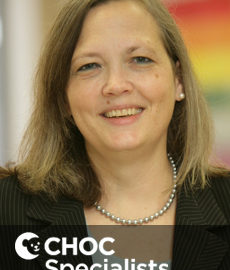
Starr, Joanne P. – MD
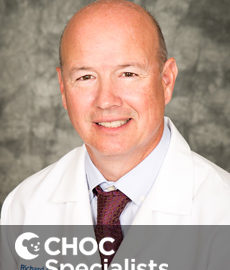
Gates, Richard – MD
Cardiothoracic Surgery – Contact Info and Locations
To Schedule a Consultation or Office Visit
Phone: 714-997-2224
Fax: 714-997-1187
Locations
Cardiothoracic Surgery
CHOC Children’s Specialists Cardiothoracic Surgery provides cardiothoracic surgery, medical treatment and follow-up care to infants, children and adolescents to repair congenital heart defects. Our pediatric cardiothoracic surgeons have completed a residency in general surgery as well as thoracic or cardiothoracic surgery, and a fellowship in congenital cardiac surgery.
CHOC has long been a leader in cardiac surgical care. Our team was instrumental in the development of new systems used to protect children’s hearts during surgery and improve heart-lung machine technology. We worked with bioengineers at Quest Medical to develop techniques and instruments that could be used to bring cardiopulmonary bypass technology to children and infants, previously available only for adults. CHOC was the first institution to offer this lifesaving technology that is now used in more than 60 institutions around the globe.
CHOC’s cardiothoracic surgeons lead the way in raising the standard of care and surgical outcomes for neonates undergoing open heart surgery. CHOC Children’s heart surgery program has the only facility in Orange County that performs newborn and pediatric open-heart surgery, and has dedicated cardiovascular operating rooms with extracorporeal life support (ECLS) and a Cardiovascular Intensive Care Unit (CVICU).
Our cardiothoracic surgeons direct the ECLS program for the hospital. The ECLS program at CHOC is a member of the International Extracorporeal Life Support Organization (ELSO) and has been designated an ELSO “Center of Excellence” . CHOC’s ECLS program provides life saving technology to neonates thru adolescents with heart and/or lung failure.
For more than a decade, CHOC has been a member of the Society of Thoracic Surgeons (STS) National Database, an international benchmarking organization that sets the highest standards for hospitals performing heart surgery. CHOC was among the first 15 institutions to join the registry and report surgical outcome data. Today, there are more than 130 premiere hospitals in the STS database.
The CHOC Specialists Cardiothoracic team offers a full range of surgical procedures to correct heart and thoracic defects:
Heart Conditions
- Norwood procedure for hypoplastic left heart syndrome
- Aortic stenosis
- Arterial switch for transposition of the great arteries
- Atrial and ventricular septal defect
- Atrioventricular (AV) canal defect
- Coarctation of the aorta
- Patent ductus arteriosus
- Pulmonary stenosis and atresia
- Tetralogy of Fallot
- Truncus arteriosus
- Vascular ring
In addition to congenital heart defects, our cardiothoracic surgeons perform procedures to correct lung and chest wall defects as well as complex vascular procedures to place specialized lines for renal dialysis and chemotherapy.
Thoracic Conditions
- Chest wall and lung malignancies
- Lung defects – congenital pulmonary airway malformations, pulmonary sequestration, spontaneous pneumothorax
- Lung infections
- Pectus excavatum
- Complex vascular access
Multidisciplinary Approach
CHOC’s multidisciplinary care complements these clinical services. Other members of the care team include additional specialists, interventionists, anesthesiologists, perfusionists, intensivists, cardiovascular nurse practitioners, respiratory therapists, dietitians, social workers, child life specialists and case managers, all of whom have specialized training and expertise.
Leading-Edge Cardiodiagnostic Services
The CHOC Children’s Specialists Cardiothoracic team is fully equipped with advanced cardiodiagnostic equipment:
- Electrocardiograms (EKG/ECG) and pediatric stationary bicycle and treadmill testing with and without additional cardiopulmonary and metabolic testing
- Holter monitoring and cardiac event recording that can be used to track an irregular heartbeat over the course of 24 hours or longer
- 2D and 3D real-time resting, stress and sedated echocardiograms
- Transesophageal echocardiograms that allow for a unique view of the heart and its structures from inside the esophagus
- 1.5T and 3T cardiac MRI with advanced 3D post processing
- Ultrafast (flash) CT angiography with advanced 3D post processing
- Fetal echocardiograms and prenatal cardiac diagnosis.
- Digital low-dose X-ray and fluoroscopy imaging
- Cardiac catheterization performed in our state-of-the-art cardiac catheterization laboratories
- Electrophysiological studies to assess and treat irregular heartbeats
- Pulmonary function testing offered in our Pulmonary Function Lab by specially trained registered respiratory therapists
- Blood tests to evaluate for illness and heart problems
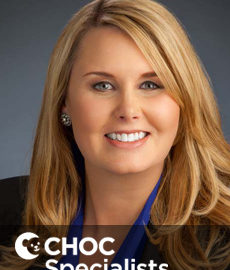
Gage, Susan – MD
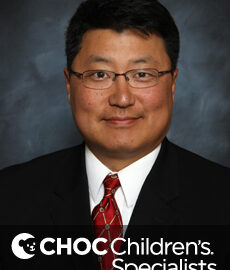
Kim, David – MD
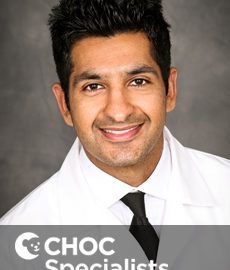
Kashmiri, Himala – DO
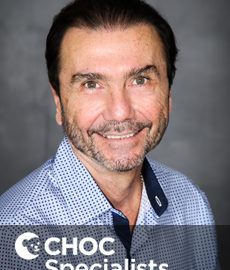
Jalili, Mehrdad – MD
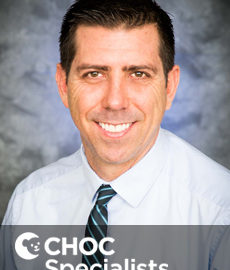
Nichols, Scott – MD (Pomona)
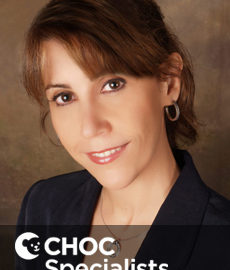
Gholizadeh, Maryam – MD
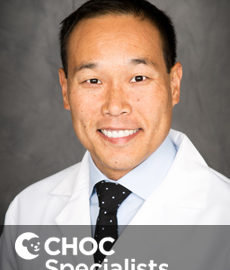
Yu, Peter T – MD
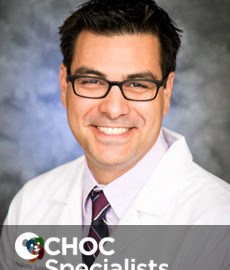
Guner, Yigit -MD
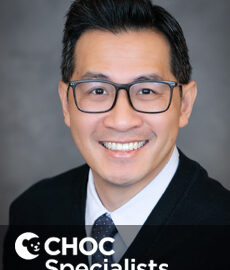
Tran, John – MD
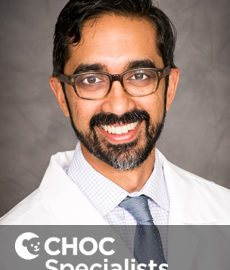
Nakra, Neal -MD
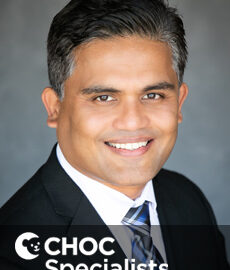
Chogle, Ashish S. – MD
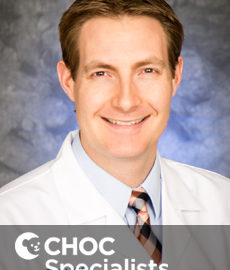
Shrey, Daniel – MD
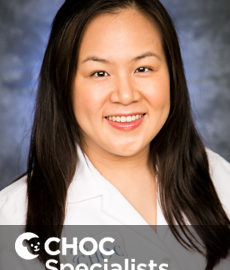
Chin, Chana – MD
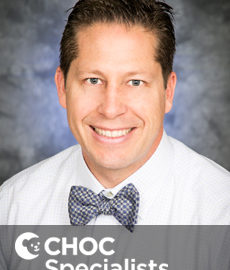
McCanta, Anthony – MD
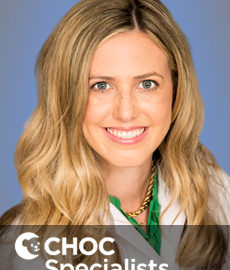
Totaro, Laura – MD
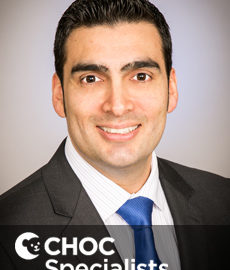
Olaya, Joffre – MD
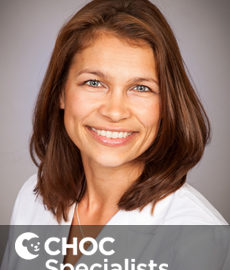
Steenari, Maija-Riikka MD
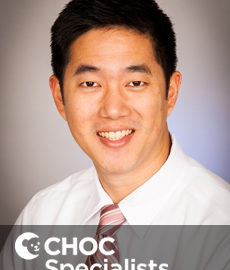
Wong, Gregory – MD
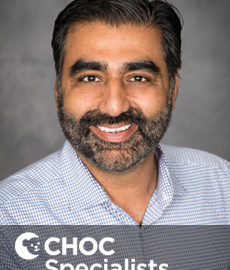
Bhangoo, Amrit – MD
Otolaryngology Center – Irvine
250 E. Yale Loop, Suite 200, Irvine, CA 92604
Hours
- Otolaryngology:
(Variable) Tuesdays, please call (714) 633-4020 for more information
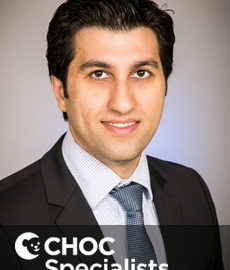
Ashrafi, Amir – MD
Neurosurgery Office
505 S. Main Street, Suite 300, Orange, CA 92868
Hours
- Neurosurgery:
Monday – Friday 8:00 am to 5:00 pm
Neurosurgery – Contact Info and Locations
To Schedule a Consultation or Office Visit
Appointments: 714-509-7070
Fax: 714-509-7074
Locations
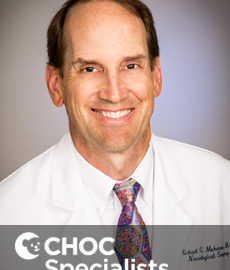
Muhonen, Michael – MD
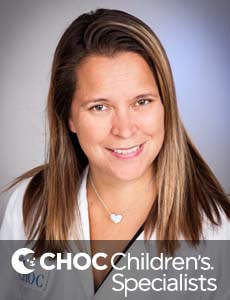
Irwin, Melanie – MD
Neurosurgery
While every effort is made for nonsurgical intervention, surgery can often be the answer to saving or improving a child’s life.
Our board certified neurosurgeons bring the highest levels of expertise and experience to even the most complex disorders of the brain, spine and central and peripheral nervous systems. They have been widely recognized for their innovation in advancing the field, including new or improved treatments for hydrocephalus, spasticity, dystonia and chronic pain. Our participation in clinical trials also provides new options for children who need more than conventional treatments.
We surgically treat the full spectrum of neurological conditions and injuries with the latest procedures:
Epilepsy
When medication isn’t enough, a number of different surgical options may help alleviate a child’s seizures. The most common procedure removes the part of the brain that is causing seizures or disconnects certain nerve pathways that spread the seizure impulses. Our neurosurgeons were among the first to perform a less invasive surgical option that places a vagus nerve stimulation device in a patient’s chest – much like a pacemaker – and sends pulses that minimize seizures.
Cerebral Palsy and Spasticity
Cerebral palsy may cause a child to have muscle weakness, poor motor control, shaking, or stiffness of the arms or legs. Our neurosurgeons have been at the forefront of treating these symptoms, and we were the first in the region to implant an intrathecal pump that delivers low-dose medication to the spinal cord and brain, causing the muscles to relax. Other surgical options include selective and non-selective dorsal rhizotomy, which involves cutting sensory nerve fibers in the spinal cord to balance out the messages of flexibility and stiffness that are sent to the muscles.
Hydrocephalus
We are the region’s leader in treating complex multicystic hydrocephalus, a condition that causes too much cerebrospinal fluid in parts of the brain. Our neurosurgeons have pioneered two unique treatments: a valve that is implanted in the brain and drains fluid, and an endoscopic third ventriculostomy, which involves making a tiny hole in the wall of the third ventricle, allowing fluid to move out of the blocked ventricle and eliminating the need for a valve.
Tumors of the Brain and Spine
Our neurosurgeons work closely with neurologists and neuro-oncologists to determine the most effective treatment plan for brain and spine tumors, including gliomas, medulloblastomas, meningiomas and pituitary gland tumors, which can often be removed endoscopically. Diagnosis and removal of a tumor are often done during the same procedure to increase the chances for a cure. Surgery may be used in combination with chemotherapy and radiation therapy to eliminate a tumor.
Moyamoya Disease
Surgery is the only option for long-term treatment of Moyamoya disease, which is a rare condition causing a narrowing of the arteries at the base of the brain and preventing blood flow to the brain. Surgery at the microvascular level requires extreme precision and expertise. Our neurosurgeons are highly experienced in treating Moyamoya disease with brain revascularization, which involves creating new vascular pathways that reroute blood flow to the brain from other areas.
Craniofacial Syndromes
At birth, a baby’s skull bones are still developing and fusing together, a process that takes about a year. Bones that fuse too early or too late can result in a craniofacial syndrome, which can damage the brain. Surgery can correct the malformations by removing, replacing or recontouring parts of the skull. We specialize in distraction osteogenesis, a method of moving two parts of a bone slowly so that new bone fills in the gap, as well as an endoscopic procedure that corrects a craniofacial problem using surgical instruments through the nasal passage, rather than opening a patient’s skull.
Birth Defects
Birth defects of the head and spine can include: encephaloceles, when a baby is born with a part of his or her brain protruding from the skull; a Chiari malformation, when brain tissue extends into the spinal canal; syringomyelia, when a cyst or hole forms in the spinal cord; spina bifida, when the spinal bones don’t close properly; and a tethered spinal cord, when the spinal cord becomes attached to the spinal column rather than floating freely. Our neurosurgeons are adept at a number of surgical procedures to repair and improve a host of congenital birth defects, including the rarest cases.
Brain Cysts
Cysts in the brain, such as a dermoid or arachnoid cyst, are tumor-like spheres filled with liquid. Surgery can be used to remove all or part of a cyst so that vital functions of the brain are not impaired. We specialize in an endoscopic procedure that corrects the problem using surgical instruments through the nasal passage, rather than opening a patient’s skull.
Concussion and Head/Spinal Cord Trauma
A traumatic injury to the head or spine requires immediate care and may require a surgical procedure such as surgical decompression, craniotomy and surgical drainage, surgical debridement and evacuation, surgical elevation and decompressive craniotomy with duraplasty.
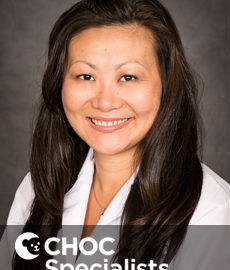
Hwang, Nina – MD
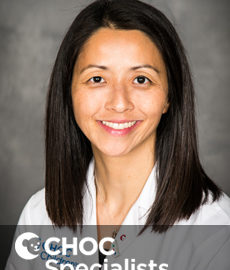
Lin, Carol – MD
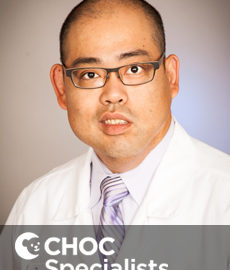
Huoh, Kevin – MD
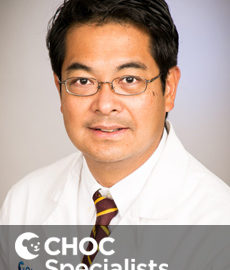
Recto, Michael – MD
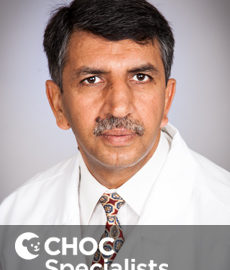
Awan, Saeed-Ur-Rehman – MD
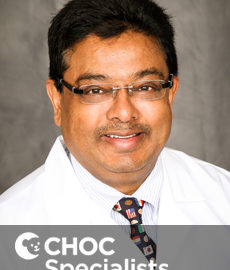
Mistry, Pankaj – MD
Pankaj Mistry, MD, is a Neonatologist with the CHOC Children’s Specialists. Dr. Mistry is board certified in pediatrics and neonatal-perinatal medicine. Dr. Mistry attended medical school at Goa Medical College, Goa, India. He completed his residency training program in pediatrics at Interfaith Medical Center, SUNY/Downstate Medical Center, Brooklyn, New York. Dr. Mistry served his fellowship in neonatal–perinatal medicine at UCLA Medical Center, Los Angeles, California.
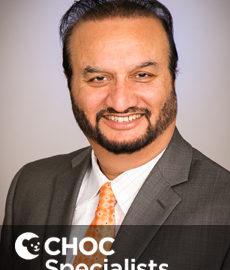
Singh, Harjinder – MD
Harjinder Singh, MD, is a Neonatologist with the CHOC Children’s Specialists. Dr. Singh is board certified in pediatrics and neonatal-perinatal medicine. Dr. Singh attended medical school at the University College of Medical Sciences, Delhi University, India. He completed his residency training program in pediatrics and served his fellowship in neonatal –perinatal medicine at Loyola University Medical Center, Maywood, Illinois.

Krishnan, Ravi – MD
Ravi Krishnan, MD, is a Neonatogist with the CHOC Specialists. Dr. Krishnan is board certified in Pediatrics and Neonatal-Perinatal Medicine. He attended medical school at Madnras Medical College & Government General Hospital, Madras, India. He completed his residency training in pediatrics at St. Lukes – Roosevelt Hospital Center, New York, New York. Dr. Krishnan served his fellowship in neonatology at Children’s Hospital of Michigan, Detroit.

Kaushal, Sandy – MD
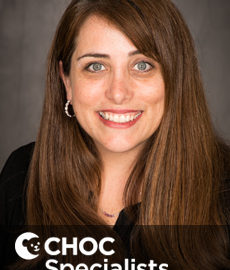
Hunt, Juliette – MD
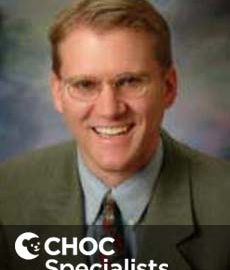
Zahn, Matthew – MD
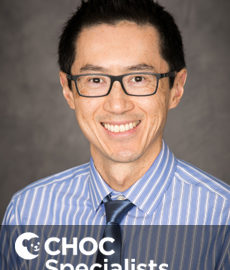
Sun, Wang-Dar – MD
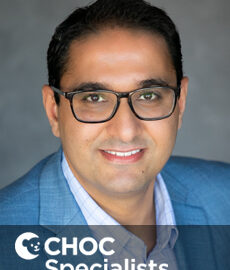
Mikhael, Michel – MD
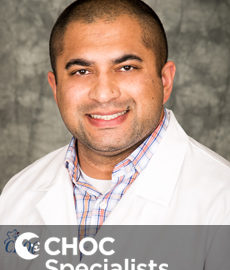
Kamath, Sunil – MD
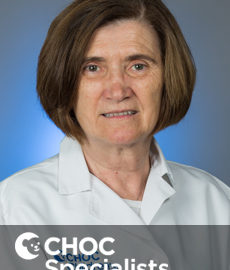
Horvath, Agnes – MD
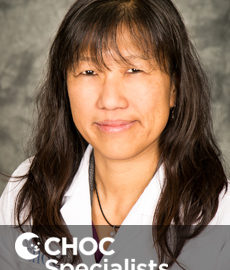
Cheung, Michele – MD
Arpan Global Charities – 2013 Mission Suyay to Latacunga, Ecuador
Arpan Global Charities is a nonprofit organization established in 2005 by one of the members of the CHOC Children’s Specialists, Dr. Sudeep Kukreja. The goal of AGC is to bring health and hope to medically underserved populations around the world while providing humanitarian assistance and medical education to those who need it the most.
Arpan Global Charities’ 13th international medical volunteer mission took place in the city of Latacunga, Ecuador and a team of 52 dedicated medical and non-medical volunteers participated. Team members had diverse backgrounds and many years of experience in their respective fields and among them were: five nurses; five pediatric residents from CHOC Children’s; an Echo Tech; three Anesthesiologists; seven Pediatricians; one Cardiologist; one Dentist; one Geneticist; one Gynecologist; one CT surgeon; one ENT surgeon; one Ophthalmologist; one Plastic surgeon; two General Pediatric surgeons; one Pediatric Orthopedic surgeon; one Orthopedic surgeon for adults; one Radiologist; one Pharmacist, and 10 non-medical volunteers.
Volunteers arrived from the United States to Quito in waves and landed in Quito’s new airport which is located approximately 90 minutes away from the city. Although team members faced multiple challenges due to delayed airport pick-ups, lost luggage, and late arrival to hotel in Quito at 2:30 a.m.; the volunteers were eager to start working so they rushed to their rooms to get some rest and were ready at 6 AM the next morning for the bus ride to their final destination, the small town of Latacunga. After a two-hour trip, the team arrived to a government clinic named Patronato where they immediately examined hundreds of patients and pre-screened them for treatments and/or surgery. Arpan Global Charities rented two facilities with operating rooms in Latacunga for surgeries: Clinica Continental and Instituto de la Mujer. Also some surgeries were performed by Pediatric Orthopedic surgeon and the Geneticist at Baca Ortiz Children’s Hospital in Quito. Furthermore, Arpan’s Genetic doctor took the initiative to collaborate with local physicians to organize a genetic conference scheduled to take place at the Sheraton hotel in Quito for the “Rare Diseases Day.” While reaching out and collaborating with local physicians, our medical team established a promising relationship with Quito’s medical faculty to discuss the development of a partnership between CHOC Children’s and Baca Ortiz Children’s Hospital in Quito to promote international collaboration and exchange programs.
Volunteers of Arpan Global Charities also visited four different orphanages in Latacunga and Quito where they examined every orphan residing in those centers and facilitated treatment, distributed clothes, and donated toys. Mission volunteers also had the opportunity to visit two schools located in very poor areas of their town where they examined every student and discovered some children who had undiagnosed serious medical conditions for which treatment was facilitated. The team of Anesthesiologists and Nursing staff provided supportive services to patients in the recovery room which allowed skilled surgeons to perform more than one hundred major surgical procedures. With the help of an Echo Technician, the Cardiologist volunteer was able to examine and treat hundreds of patients. Even the Dentist surgeon was kept extremely busy from 8 a.m. to 6 p.m. everyday with long lines of patients eagerly waiting to see him.
The help and support of the nursing members, pediatric residents, pharmacist, non-medical volunteers, Ecuadorian volunteers and Ecuadorian medical students was phenomenal. This mission would have not been possible without them. Besides providing free medical care to the most underserved population in Ecuador, Arpan Global team members were also involved in education of local nurses, medical students, and doctors in both Latacunga and Quito.
Considering that team members had limited equipment and very scarce medical supplies, it is important to acknowledge their caring attitude and sense of commitment for these qualities enabled them to work long hours on a daily basis to provide humanitarian healing to all their patients. Indeed, the team’s dedication and hard work enabled Arpan Global Charities to touch the lives of more than 1,500 Ecuadorian children and adults. A lot was accomplished during this missionary trip which makes it one of the most exciting and successful medical volunteer mission of Arpan Global Charities.
A very special thanks to the Baum Family (Paulina, Carlos, Monica, Jose and grandparents) from Quito for their relentless help and support to make this mission a big success.
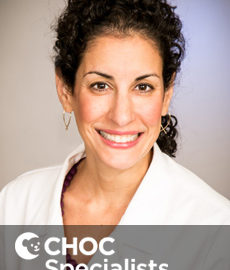
Field, Sarah – MD
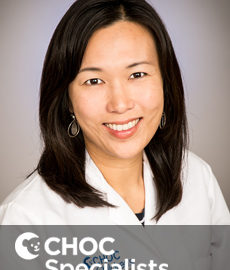
Chan, Wan-Yin – MD
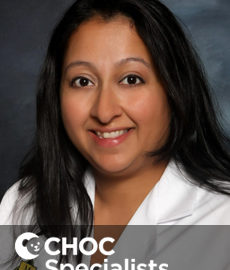
Galion, Anjalee – MD
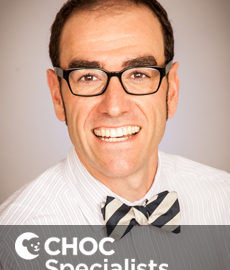
Shulman, Andrew – MD PhD
Furlan, Scott – MD
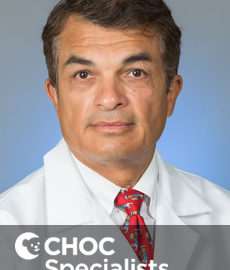
Reyna, Troy – MD
Troy Reyna, MD, FACS, FAAP is a CHOC Children’s Specialist Pediatric Surgeon, board certified in Pediatric Surgery and General Surgery by the American Board of Surgery. Dr. Reyna is a graduate of the United States Military Academy at West Point, New York where he majored in chemistry. He received his medical degree from Georgetown University Medical School, Washington, D.C. He completed his surgical internship at Walter Reed Army Medical Center, Washington, D.C. and his surgical residency at Tripler Army Medical Center, Honolulu, Hawaii. Dr. Reyna served his Pediatric Surgery fellowship at Columbus Children’s Hospital, Columbus, Ohio.
Dr. Reyna retired from the U.S. Army after serving as an officer for 21 years. He was stationed in Germany, Central America, and Iraq during “Operation Desert Storm”. He is a faculty member and instructor of Advanced Trauma Life Support with the American College of Surgeons. He is a fellow of the surgical section, the section on critical care, and the section on child abuse and neglect with the American Academy of Pediatrics. Dr. Reyna is a certified diplomate of the American Board of Forensic Examiners.
With his private practice in Las Vegas, Nevada, Dr. Reyna was one of the first to introduce minimally invasive surgery for children. The first laparoscopic cholecystectomy (gallbladder removal) was performed by Dr. Reyna in 1993. The first laparoscopic Nissen fundoplication was done in 1996. Through the years, his methodology has advanced and changed with the times, but his goal remains unchanged: ”To provide the best care for our children.”
Dr. Reyna’s clinical interests include Hirschsprung disease, pectus excavatum and carinatum surgery, and the care and management of childhood cancers. He speaks fluent German and Spanish.
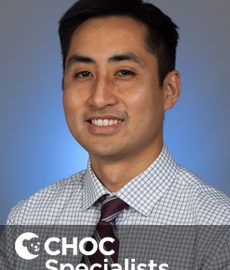
Pham, Nguyen MD
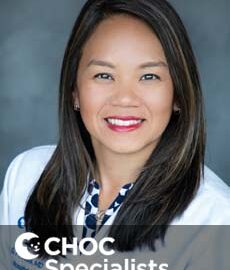
Pechulis, Georgie – MD
Georgie Pechulis, M.D. is a CHOC Children’s Specialist Hospitalist. Dr. Pechulis received her medical degree from the University of Illinois, Chicago, Illinois. She completed her residency in Pediatrics at CHOC, Orange, California, and was then Chief Resident. Dr. Pechulis is licensed by the Medical Board of California and is affiliated with the American Academy of Pediatrics.
Dr. Pechulis enjoys outdoor activities, including running, biking surfing, hiking, snowboarding and traveling. She speaks fluent Spanish.
CHOC Specialists continue tradition of supporting the Ronald McDonald House Golf Tournament Fundraiser benefitting the Ronald McDonald House of Orange County
Irvine Pediatrics
16300 Sand Canyon Ave., Suite 811, Irvine, CA 92618
Hours by Specialty
- Cardiology: Variable avialability monthly.
Kid’s Institute for Development & Advancement (KIDA)
17861 Von Karman Ave., Irvine, CA 92614
Controversies in Pediatric Cardiology for the Primary Care Professional Saturday, March 3rd, 2012
Controversies in Pediatric Cardiology for the Primary Care Professional (PDF download)
Register earlyl and save $25!
Please contact Susan Schwamb, at [email protected] for futher information.
CHOC Follies XV – Thursday, March 29th & Friday, March 30th, 2012
CHOC Follies XV Benefitting CHOC Chilren’s Foundation (PDF download)
Please contact Zach Moonitz, Director of Special Events and Corporate Relations CHOC Foundation, at [email protected] for futher information.
2nd Annual CHOC Charity Classic Monday, May 13th, 2012
2012 2nd Annual CHOC Charity Golf Classic Flyer (PDF download)
Please contact Zach Moonitz, Director of Special Events and Corporate Relations CHOC Foundation, at [email protected] for futher information.
CHOC Cherishes Children Gala – Saturday, January 21st, 2012
2012 CHOC Cherishes Children Gala (Save the Date Flyer)
Please contact Zach Moonitz, Director of Special Events and Corporate Relations CHOC Foundation, at [email protected] for futher information.
Grand Rounds Schedule – January – February 2012
Download the January – February Grand Rounds Schedule PDF here:
Grand Rounds Schedule ~ January – February 2012
Take the 2012 CHOC Physician Satisfaction Survey here:
This survey is a great opportunity to share your perceptions across a variety of key areas that affect your engagement at CHOC. This online survey will be active from June 18 to July 6th, 2012. Thank you for taking the time to participate.
Innovations in Pediatric Emergency Care Conference – Friday, January 27th, 2012
6th Annual Autism Research Conference – January 21st, 2012
Lebel, Sylvie – MD
Sylvie Lebel, M.D. is a CHOC Specialist in Gastroenterology. She is board certified in Pediatric Gastroenterology and Hepatology & Transplantation with the American Board of Pediatrics. Dr. Lebel received her medical degree at McGill University, Montreal, Canada. She completed her internship , residency and fellowship training in Pediatrics and Pediatric Gastroenterology at the University of Manitoba, Winnipeg, Canada. She served her fellowship in Pediatric Gastroenterology, Pediatric Liver Transplantation and Immunology Research at the University of Toronto, Canada. Dr. Lebel also received her Masters in Physiology at the Royal College of Physicians and Surgeons of Canada – Clinician Investigator Program at the University of Toronto, Canada.
Nelson Mandela Hospital Executives Visit CHOC
CHOC was recently honored to host a visit from Nelson Mandela Children’s Hospital Leaders. Visitors included Sibongile Mkhabela, CEO, and Nana Magomola, Hospital Trustee.
The purpose of the visit was to gain insight and clinical information in preparation for the new Nelson Mandela Children’s Hospital currently under construction in Johannesburg, South Africa, scheduled to open in 2014.
From left to right: Dr. Paul Lubinsky, Dr. Leonard Sender, Nana Magomola, Sibongile Mkhabela, Jennifer Trubenbach, Kim Cripe, Joyce Morell, Dr. Nick Anas
Pediatric General and Thoracic Surgery Office (primary)
505 S. Main St., Suite 225, Orange, CA 92868
Hours
- General Surgery: Monday – Friday 8:00am to 5:00pm
Pediatric General and Thoracic Surgery – Contact Info and Locations
To Schedule A Consultation
Appointments: 714-364-4050
Fax: 714-364-4051
Locations
CHOC Specialists Pediatric General and Thoracic Surgery
CHOC Specialty Center, Newport Beach
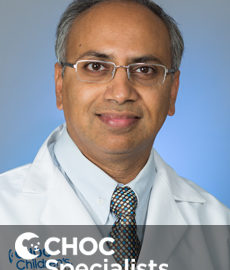
Kabeer, Mustafa – MD
Mustafa Kabeer, MD, FACS, FAAP is a CHOC Specialists Pediatric Surgeon, board certified by the American Board of Surgery in Pediatric Surgery, General Surgery and Surgical Critical Care. Dr. Kabeer attended medical school at the University of Missouri, Columbia. He completed both his internship and his residency training at Indiana University. He served his fellowship at the Children’s Hospital of Michigan. He is affiliated with the American College of Surgeons and the American Pediatric Surgical Association.
Dr. Kabeer is dedicated to investigating new and innovative ways to treat patients. Over the last ten years, he has been engaged in the investigation of the use of autologous splenic lymphoctye reinfusion to augment vaccine efficacy against gram negative encapsulated organisms. He has a background in tumor cell vaccine and cytokine research and is interested in working with stem cells in order to grow small intestines. He is currently researching the use of Raman spectroscopy in the diagnosis of pediatric tumors and in the diagnosis of Hirschsprung’s disease. He has dedicated a great deal of time and effort toward researching surgical robotics.
Dr. Kabeer performed the first robotic surgery at CHOC in 2003. Additionally, he performed the world’s first robotic pediatric lung resection and has performed many robotic tumor resections. Dr. Kabeer’s other research interests include immunology and cytokine response to injury. He serves on the CHOC Board of Directors. His philosophy of care is treating all children as if they are his own. Dr. Kabeer speaks fluent Gujarati and Hindi.
Dr. Kabeer’s favorite aspect of the physician-patient relationship is trust. “It is humbling to know and realize that parents entrust their most valuable possession to you in their time of greatest need.” – Dr. Mustafa Kabeer
Videos
Dr. Mustafa Kabeer, Pediatric Surgeon, speaks about quality care for CHOC patients
Dr. Mustafa Kabeer Discusses Pediatric Robotic Surgery
Published Works
Publications link:
Dr. Mustafa Kabeer Publications
( † Disclaimer: This search is powered by Google Scholar. Google Scholar is a third-party website with no affiliation with CHOC.)
Lieber CA, Nethercott HE, Kabeer MH. Cancer field effects in normal tissues revealed by Raman spectroscopy. Biomed Opt Express. 2010 Sep 20;1(3):975-982.
Lieber CA, Kabeer MH. Characterization of pediatric Wilms’ tumor using Raman and fluorescence spectroscopies. J Pediatr Surg. 2010 Mar;45(3):549-54.
Klein, MD, Langenburg, SE, Kabeer, M, Lorincz, A, Knight, CG., Pediatric Robotic Surgery: Lessons From a Clinical Experience. Journal of Laparoendoscopy and Advanced Surgical Techniques, 2007, April, 17(2):265-271
Langenburg, S, Kabeer, M, Knight, C, Fleischmann, L, Auner, G, Lyman, W, Klein, M., Surgical Robotics: Creating a New Program. Pediatric Endosurgery and Innovative Techniques, 2003, 7(4):415-419.
Liu, Q., Kabeer, M., Callahan, M., Orazi, A., Pescovitz, M., Grosfeld, J., Mesocaval Shunt Inhibits Primary and Metastatic Hepatoma Growth and Enhances Apoptosis. Journal of Pediatric Surgery, 1998, 33(7); 1128-33.
Kogon, B., Kabeer, MH., Billings, S., Sawchuk, A., Dalsing, M., Angiosarcoma Arising from an Occluded Popliteal Artery Pseudoaneurysm. Journal of Vascular Surgery, 1998, 27(5):970-3.
Kabeer, MH., Filo, RS., Milgrom, ML., Pescovitz, MD., Leapman, SB., Lumeng, L., Jindal, RM., Central Pontine Myelinolysis Following Orthotopic Liver Transplant and Association with Cyclosporine Toxicity., Postgraduate Medical Journal, 1995, 71(834):239-241
Nygard, NR., Bono, C., Brown, LR., Gorka, J., Giacoletto, KS., Schaiff, T., Graham, MB., McCourt, DW., Kabeer, MH., Braciale, VL., Braciale, TJ., Schwartz, BD., Antibody Recognition of an Immunogenic Influenzae Haemaglutinin-Human Leucocyte Antigen Class II Complex., Journal of Experimental Medicine., 1991, Vol. 174, pp.243-251.
Tollefsen, DM., Wiegel, CJ., Kabeer, MH., The Presence of Methionine or Threonine at Position 381 in Vitronectin is Correlated with Proteolytic Cleavage at Arginine-379., The Journal of Biological Chemistry, 1990, Vol. 265(17), pp.9778-9781.
Musser, JM., Kroll, JS., Granoff, DM., Moxon, ER., Brodeur, BR., Campos, J., Dabernat, H., Frederiksen, W., Hamel, J., Hammond, G., Hoiby, EA., Jonsdottir, KE., Kabeer, MH., Kallings, I., Khan, WN., Kilian, M., Knowles, K., Koornhof, HJ., Law, B., Li, KI., Montgomery, J., Pattison, PE., Piffaretti, JC., Takala, AK., Thong, ML., Wall, RA., Ward, JI., Selander, RK., Global Genetic Structure and Molecular Macroepidemiology of Encapsulated Haemophilus influenzae., Reviews of Infectious Disease, 1990, Vol. 12(1), pp. 75-111.
Weinberg, GA., Ghafoor, A., Ishaq, Z., Nomani, NK, Kabeer, MH., Anwar, F., Burney, MI., Qureshi, AW., Musser, JM., Selander, RK., Granoff, DM., Clonal Analysis of Haemophilus inflluenzae Isolated from Children from Pakistan with Lower Respiratory Infections., Journal of Infectious Disease, 1989, Vol. 160, pp. 634-643
Munson, RM., Kabeer, MH., Lenoir, AA., Granoff, DM., Epidemiology and Prospects for Prevention of Hamophilus influenzae Disease in Developing Countries., Reviews of Infectious Disease, 1989, Vol. 11S, pp. S588-597.
Granoff, DM, Sheetz, K., Pandey, JP., Nahm, MH., Rambeck, JH., Jacobs, JL., Musser, JM., Selander, RK., Kabeer, MH., Murphy, TV., Osterholm, MT., Host and Bacterial Factors Associated with Haemophilus influenzae Type b Disease in Minnesota Children Vaccinated with Type b Polysaccharide Vaccine, Journal of Infectious Disease, 1989, Vol. 159, pp. 908-916.
Books and Chapters
Kabeer, MH, Lam, VT, Gibbs, DG, Robotics Technology in Pediatric General and Thoracic Surgery; Robotics in Surgery; edit. Faust; Nova Science Publishers, Inc; 2007 Kabeer MH, Klein MD, Acute Renal Failure in Neonates and Infants; Current Pediatric Surgery; edit. Mattei; 1st edition; Williams and Wilkins; 2002
Kabeer MH, Klein MD, Intestinal Obstruction; Acute Care Pediatric Intesive Care Unit Handbook; edit. Lieh-Lai; 2nd edition; Lippincott; 2001
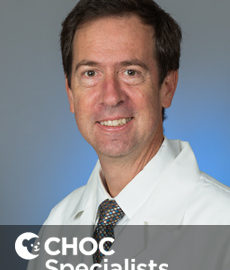
Gibbs, David – MD
David Gibbs, MD, FACS, FAAP, is President of the Medical Staff at CHOC and is the CHOC Children’s Specialists Division Chief of Pediatric Surgery. Dr. Gibbs is board certified in Pediatric Surgery and General Surgery.
Dr. Gibbs attended medical school at Ohio State University. He completed both his internship and residency at Massachusetts General Hospital in Boston followed by serving his fellowships at the UCSF Fetal Treatment Center in San Francisco; Long Island Jewish Medical Center; Schneider Children’s Hospital/Pediatric Surgery in New Hyde Park, New York.
Dr. Gibbs is affiliated with American College of Surgeons, and the Orange County Medical Association. Honors include the Marshall Bartlett Research Fellowship and the Medical Staff award at Ohio State University. His clinical interests include pediatric laparoscopic surgery. He is actively involved in patient care advocacy within the community and at the state level. Dr. Gibbs speaks fluent Spanish.
Published Works
Publications† link:
Dr. David Gibbs Publications
( † Disclaimer: This search is powered by Google Scholar. Google Scholar is a third-party website with no affiliation with CHOC.)
Pediatric General and Thoracic Surgery
The Pediatric General and Thoracic Surgeons of CHOC Specialists are available 24 hours a day, 7 days a week. We have offices throughout the Orange County area and are available for consultative services at multiple hospitals. Our highly experienced Pediatric Surgeons provide innovative and efficient care to improve the quality of life for both the child and their family.
- Congenital disorders including skeletal dysplasias and osteogenesis imperfecta
- Chronic Intestinal Pseudo-Obstruction (CIPO)
- Cloacal anomalies
- Difficult-to-treat or chronic constipation
- Exstrophy of the Bladder
- Fecal incontinence
- Hirschsprung disease
- Imperforate anus
- Inflammatory bowel disease (IBD), including Crohn’s disease and ulcerative colitis
- Inguinal Hernia
- Umbilical Hernia
- Lumps & Bumps
- Neurogenic bladder
- Orchiopexy (Undescended Testicle)
- Hydrocele
- Pectus Excavatum & Carinatum
- Circumcision (not newborn)
- Supprelin Implants (Precocious Puberty)
- Spina bifida
- Fundoplications
- Intussusception
- Malrotation
- Cholecystectomy
- Gastroschisis & Omphalocele
- Ganglion Cysts
Surgeries Performed Include:
- Robotic Surgery
- Minimally Invasive Surgery
- Thoracic Surgery
- Nuss Procedure (minimally invasive repair of Pectus Excavatum)
- Skin and soft tissue lumps and bumps
- Pectus deformities
- Thyroglossal duct cyst
- Branchial cleft cyst
- Inguinal hernia repair
- Circumcision
- Orchiopexy
- Lung lesions
- Diaphragm abnormalities
Pediatric Surgery Research
Dr. Mustafa Kabeer
Dr. Kabeer is dedicated to investigating new and innovative ways to treat patients. Over the last ten years, he has been engaged in the investigation of the use of autologous splenic lymphoctye reinfusion to augment vaccine efficacy against gram negative encapsulated organisms. He has a background in tumor cell vaccine and cytokine research and is interested in working with stem cells in order to grow small intestines. He is currently researching the use of Raman spectroscopy in the diagnosis of pediatric tumors and in the diagnosis of Hirschsprung’s disease. He has dedicated a great deal of time and effort toward researching surgical robotics. Dr. Kabeer performed the first robotic surgery at CHOC in 2003. Additionally, he performed the world’s first robotic pediatric lung resection and has performed many robotic tumor resections.
For more information, please contact:
CHOC Children’s Specialists Pediatric Surgery administrative office at 714-364-4050.
Sola, Augusto – MD
Augusto Sola, M.D. is a CHOC Specialists Neonatologist, board certified in Pediatrics and Neonatology. Dr. Sola has been has over 20 years of experience in Neonatology in two different countries and in six different large centers. Currently, he is President of SIBEN and on sabbatical on International Neonatal Education and Health Care and has written two new books on neonatology.
Dr. Sola has extensive experience in Neonatal medicine and in Perinatal medicine. He trained under and worked with the pioneers of fetal physiology at the University of California, San Francisco and also worked for many years as the neonatologist of the Fetal Treatment Center at UCSF, one of the first such centers in the world dedicated to the treatment of human fetus with serious clinical conditions.
Dr. Sola received his medical degree at the University of Buenos Aires Medical School, Argentina. He completed his pediatric residency training and served his fellowship at the University of Massachusetts in Worcester, where he was later named Senior Chief Resident in Pediatrics.
Dr. Sola completed post graduate studies at the University of California in San Francisco and the Cardio Vascular Research Institute. Before returning to his home country, he worked for two years as a neonatologist in New Orleans (So. Baptist and Tulane).
Once in Argentina, he soon became Chief of Newborn Services at the “Hospital de Clínicas” of the University of Buenos Aires. There, Dr. Sola developed clinical neonatal intensive services and established mechanical ventilation; initiated training in neonatal medicine and, initiated the first neonatal fellowship program for MD’s with a completed pediatric residency.
At the National Pediatric Hospital (J.P. Garrahan Hospital), Dr. Sola was appointed Director of Neonatology and designed the neonatal unit and supporting services. During the process he developed the concept of “Neonatal Recovery Unit”, where the parents of infants who no longer needed intensive care, but remained ill and had to remain hospitalized, would live with their infants, improving the transition from hospital to home and shortening hospital stay. This was an original and revolutionary concept at the time. Dr. Sola developed the first organized programs in the nation for long-term follow-up of NICU graduates both at both the Hospital de Clínicas and at Garrahan Hospital.
Dr. Sola served as full Professor of Pediatrics at the University of Buenos Aires. He created the “Fundación para el Recien Nacido” a non profit organization that assisted poor families and ill newborns.
Dr. Sola returned to the United States to become Director of Neonatal Clinical Services at the University of California in San Francisco. There he joined distinguished specialists in the field, was part of the Fetal Treatment Center and was interim director of the ECMO program. He also became progressively more involved in research in areas of neonatal neurology. Dr. Sola then accepted the position of Professor of Pediatrics.
Dr. Sola moved on as Division Director of Neonatology at Cedars Sinai Medical Center and Professor of Pediatrics at UCLA. There he re-established the neonatal fellowship program, was given an endowed Chair and started to become involved in the study of neonatal oxygenation and outcome improvement.
Dr Sola was tenured Professor of Pediatrics, and Obstetrics and Gynecology, at Emory University in Atlanta where he also held the Goddard Scholarship and directed the Division of Neonatal Perinatal Medicine, the neonatal laboratory for investigations of the mechanisms of injury and protection to the developing brain and the neonatal fellowship training program. During his tenure at Emory and under his leadership, the division became more academically involved, the fellowship program grew exponentially, clinical and grant funding expanded notably and, most importantly, neonatal clinical outcomes improved.
Dr. Sola’s neonatal professional activities have encompassed education, research, administration and clinical care. He is an “appassionato clinician” and still takes calls in-house at night and on weekends. He has developed and collaborated to develop innumerable neonatal centers, in Latin America and in the United States.
Dr. Sola has developed and established training programs; he has helped many physicians and nurses in their education, training and careers. He stimulates and collaborates with many throughout the America’s and Spain. Some of his colleagues and friends have called him “a trigger” that makes things happen. One of his former trainees, Dr. Adrian Soto, who subsequently became an excellent friend and unfortunately died at a young age because of cancer, was the first one to call Dr. Sola “an enzyme”, he who acts on a substrate and makes the final product much better. Clinical work and improved infants’ outcomes have been his passion and a driving stimulus.
Achievements & Honors
Dr. Sola has been recognized with numerous prestigious awards including being recognized for his contributions to education and leadership as one of The Ten Distinguished Young Professionals in Argentina and nominated among The Ten Top in the world.
Dr. Sola also been a recipient of the following awards:
• American Academy of Pediatrics Christopherson Award, for his contributions to International Child Health
• University of California San Francisco, Faculty Teaching Award, Department of Pediatrics
• University of Massachusetts, First Recipient of the Braden E. Griffin M.D. Lectureship
• World Health Organization (WHO) Perinatal Collaborating Center, Atlanta, Georgia. Dr. Cicely Williams Award in Recognition of Excellence
Dr. Sola has been a visiting professor at many universities and medical centers in the USA and Latin America and has been named member of honor of neonatal societies and pediatric societies in Spain, Cuba, Colombia, Paraguay and others. In addition, Dr. Sola has been recognized as one of America’s Top Doctors, and among the Best Doctors in the Bay Area and in Atlanta. Furthermore, he was accepted as member of the American College of Ethical Physicians and is listed in WHO IS WHO in America for his professional accomplishments.
More Honors
• Who’s Who in America, 2008
• J. Braverman Award, Argentina Pediatric Society
• Ten Outstanding Young Professionals of Argentina International Junior Chamber, Argentina
• Award for Educational, Scientific and Clinical Contributions to Pediatrics in Paraguay
• “Top Doctors of America in Neonatal-Perinatal Medicine” Award
• Leadership Award, presented by the Center for Black Women’s Wellness, Inc.
• “Top Doctors of Atlanta” Award, WHO Perinatal collaborating Center: Dr. Cicely Williams Award in Recognition of Excellence.
• “American’s Top Doctors” — Castle Connolly Award
• Named Honorary or Distinguished Member of various International Pediatric Societies and Distinguished and Visiting Professorships, including Colombia, Cuba, Barcelona and Cataluña, Paraguay, Uruguay and the United States.
Societies
Dr. Sola is a member of the following societies:
• American Pediatric Society (APS)
• Society for Pediatric Research (SPR)
• American Academy of Pediatrics (AAP – Fellow)
• AAP Section on Community and International Child Health
• AAP Section on Perinatal Pediatrics
• Society for Neuroscience
• Southern Society for Pediatric Research (SSPR)
• New York Academy of Sciences
• American Association For The Advancement Of Science
• Eastern Society For Pediatric Research
• European Society for Pediatric Research
• SIBEN, Ibero American Society of Neonatology – SIBEN.net
Dr. Sola is a past member of these societies:
• Western Society for Pediatric Research (WSPR)
• American Thoracic Society (ATS)
• Pediatric Society of Argentina
• Latin American Society for Pediatric Research
• California Association of Neonatologists (CAN)
• National Association of Hispanic Physicians
• Southeastern Association of Neonatologists (SAN)
• Society for Critical Care Medicine (SCCM)
Educational Activities
Dr. Sola enjoys participating in education, and this occupies a significant portion of his life outside of work. His passion for Education started when he was a medical student. Dr. Sola has embraced the motto that “to teach is to learn twice” and has committed a significant proportion of his professional career to education. Over the years, he has received several prestigious teaching awards.
Publications
Dr. Sola has written two text books in Spanish in the field of Neonatal Medicine.
The first one, titled “Cuidados Intensivos Neonatales, Fisiopatologia and Terapeutica”. This book was extremely important in the developing field of newborn care, mostly in Latin American countries, in an era of no internet, e-mails or faxes.
The second one is a two volume book, written with his wife, Marta R. Rogido MD. It is entitled “Cuidados Especiales del Feto y el Recien Nacido” (Special Care of the Fetus and Newborn)
Dr Sola has written two neonatal books in the Spanish language: One is a comprehensive, multi author text book, with more than 60 authors from various countries and more than 1,500 pages, (“CUIDADOS NEONATALES: DESCUBRIENDO LA VIDA DE UN RECIÉN NACIDO ENFERMO” – ‘Neonatal Care: Discovering the life of a sick newborn’).
Dr. Sola also has many chapters in neonatal and pediatric manuals and textbooks written in the USA, Argentina, Chile, Mexico and other nations. In the field of Neonatal Medicine, Dr. Sola has over 80 publications in peer reviewed journals, both in basic research and in clinical topics.
Dr. Sola’s most important recent publications have focused in three topics:
1. Severe hypoxemic respiratory failure in the newborn, exploring the use of oral sildenafil (Viagra).
2. Mechanisms of injury and protection in the developing brain.
3. Improving outcomes by changing the practice of oxygen administration and pulse oximetry monitoring.
The recent most important publications in peer reviewed journals in those three areas of neonatal medicine include:
Recent Publications
1. Sola, A. Turn off the lights and the oxygen, when not needed: phototherapy and oxidative stress in the neonate. JPediatr (Rio J). 2007;83(4):293-296
2. Bouzas L, Bauer G, Novali L, Dilger A, Galina L, Falbo J, Díaz González L, Manzitti J, Sola A. Retinopathy of prematurity in the XXI century in a developing country: an emergency that should be resolved. An Pediatr (Barc). 2007 Jun;66(6):551-8
3. Sola A, Dieppa FD, Rogido MR. An evident view of evidence-based practice in perinatal medicine: absence of evidence is not evidence of absence. J Pediatr (Rio J). 2007 Sep-Oct;83(5):395-414
4. Sola A, Peng H, Rogido M, Wen TC. Animal models of neonatal stroke and response to erythropoietin and cardiotrophin-1. Int J Dev Neurosci. 2008 Feb;26(1):27-35.
5. Sola A, Rogido M. Iron, oxidant injury, and practice choices in preterm infants. J Pediatr. 2008 Feb;152(2):295-6;
6. Castillo A, Sola A, Baquero H, Neira F, Alvis R, Deulofeut R, Critz A. Pulse oxygen saturation levels and arterial oxygen tension values in newborns receiving oxygen therapy in the neonatal intensive care unit: is 85% to 93% an acceptable range? Pediatrics. 2008 May;121(5):882-9
7. Sola A. Oxygen for the preterm newborn: one infant at a time. Pediatrics. 2008 Jun;121(6):1257
8. Sola A. Oxygen in neonatal anesthesia: friend or foe? Curr Opin Anaesthesiol. 2008 Jun;21(3):332-9.
9. Sola A, Saldeño YP, Favareto V. Clinical practices in neonatal oxygenation: where have we failed? What can we do? J Perinatol. 2008 May;28 Suppl 1:S28-34.
10. Various and Sola A. (“Grupo de Trabajo Colaborativo Multicéntrico para la Prevención de la Ceguera en la Infancia por Retinopatía del Prematuro”) Recommendations for Retinopathy of Prematurity screening in at-risk populations Arch Argent Pediatr. 2008 Feb;106(1):71-6
11. Sola A, Golombek SG, Baquero H, Borbonet D, Cabañas F, Fajardo C, Goldsmit G, Lemus L, Miura E, Pellicer A, Pérez JM, Rogido M, Zambosco G, van Overmeire B: First SIBEN clinical consensus: diagnostic and therapeutic approach to patent ductus arteriosus in premature newborns. An Pediatr (Barc). 2008 Nov;69(5):454-81.
12. Bui T, Sequeira J, Wen TC, Sola A, Higashi Y, Kondoh H, Genetta T : ZEB1 links p63 and p73 in a novel neuronal survival pathway rapidly induced in response to cortical ischemia. PLoS ONE. 2009;4(2):e4373. Epub 2009 Feb 4.
Editorials / Commentary
1. Postnatal Steroids: Short-term gain, long-term pain? Neil N. Finer, MD, Alissa Craft, DO, MBA, Yvonne E. Vaucher, MD, MPH, Reese H. Clark, MD and Augusto Sola MD J Pediatr 2000:137:9-13
2. An evident view of evidence-based practice in perinatal medicine: absence of evidence is not evidence of absence. Augusto Sola, Fernando Dominguez Dieppa, Marta R. Rogido J Pediatr (Rio J). 2007;83(5): 395-414. (Evidence-based medicine, number needed to treat, randomized trials, outcome variables, treatment effects, critical reading, statistical significance.)
3. Sola, A. Turn off the lights and the oxygen, when not needed: phototherapy and oxidative stress in the neonate. J Pediatr (Rio J). 2007 Jul-Aug;83(4):293-6.
Mechanisms of injury and protection in the developing brain:
1. Sola A, Piecuch R. Prevalence of cerebral palsy: estimations, calculations and neonatal care. Pediatrics. 1994 Jan;93(1):152-3.
2. Sola A Berrios M, Gregory A, Ferriero D. Fructose-1,6-bisphosphate after hypoxic ischemic injury is protective to the neonatal rat brain. Brain Res. 1996 25;741(1-2):294-9
3. Westmark KD, Barkovich AJ, Sola A, Ferriero D, Partridge JC. Patterns and implications of MR contrast enhancement in perinatal asphyxia: a preliminary report. AJNR Am J Neuroradiol. 1995;16(4):685-92.
4. Barkovich AJ, Westmark K, Partridge C, Sola A, Ferriero DM. Perinatal asphyxia: MR findings in the first 10 days. AJNR Am J Neuroradiol. 1995;16(3):427-38.
5. Barkovich AJ. MR contrast enhancement of the normal neonatal brain. AJNR Am J Neuroradiol. 1997;18(9):1713-7
6. Van Bel F, Sola A, Roman C, Rudolph AM. Role of nitric oxide in the regulation of the cerebral circulation in the lamb fetus during normoxemia and hypoxemia. Biol Neonate. 1995;68(3):200-10
7. Van Bel, Sola A, Rudolph AR. Perinatal regulation of the cerebral circulation: role of nitric oxide and prostaglandins. Pediatr Res. 1997;42(3):299-304
8. Barkovich AJ. Prediction of neuromotor outcome in perinatal asphyxia: evaluation of MR scoring systems. AJNR Am J Neuroradiol. 1998;19(1):143-9
9. Finer N, Craft A, Vaucher Y, Clark R, Sola A. Postnatal Steroids: Short Term Gain, Long Term Pain? J Pediatr, 2000 July; 137 (1): 9-13.
10. Gressens P, Sola A. Environmental factors and disturbances of brain development. Semin Neonatol. 200;6(2):185-94.
11. Gressens P, Rogido M, Paindaveine B, Sola A. The Impact of Frequent Neonatal Intensive Care Practices on the Developing Brain. J Pediatr,140:646-653, 2002.
12. Rogido, M, Husson I, Bonnier C, Lallemand MC, Merienne C, Gregory GA, Sola A, Gressens P. Fructose-1, 6 biosphate prevents excitotoxic neuronal cell death in the neonatal mouse brain. Brain Res Dev Brain Res, Feb;140:287-297, 2003.
13. Baserga MC, Gregory GA, Sola A. Cerebrovascular Response in Small Preterm Infants during Routine Nursery Gavage Feedings. Biol Neonate, 83:12-18, 2003.
14. Wen TC, Rogido M, Gressens P, Sola A. A reproducible experimental model of focal cerebral ischemia in the neonatal rat. Brain Research Protocols, 13:76-83, 2004.
15. Wen, TC, Rogido, M, Genetta, T, Sola, A. Permanent focal cerebral ischemia activates erythropoietin receptor I in the neonatal rat brain. Neurosci Lett, 355(3):165-168, 2004.
16. Valerie Boss, Augusto Sola, Tong-Chun Wen, Michael J. Decker. Mild Intermittent Hypoxis Does Not Induce Stress Responses in the Neonatal Rat Brain. Biology of the Neonate 2005;88:313-320
17. Sola A, Rogido M, Lee B, Genetta T, Wen TC. Erythropoietin after Focal Cerebral Ischemia Activates the Jaanus kinase-signal transducer and activator of transcription signaling pathway and improves brain injury in postnatal day 7 rats. Pediatr Res, Apr;57(4):481-7, 2005.
18. Sola A, Wen T-C, Hamrick S, Ferriero DM. Potential for Protection and Repair following Injury to the Developing Brain: A Role for Erythropoietin? Pediatr Res, May; 57(5), part 2:110R-117R, 2005.
19. Baserga M, Bertolotto C, Sola A. Different Doses of Dopamine have heterogeneous effects on Cerebral Hemodynamics and Dopamine Receptors in Young Rabbits as measured with Near-Infrared Spectroscopy. Biol Neonate, Jan 14;87(4):229-235, 2005.
20. Deulofeut R, Sola A. Injury to the Developing Brain in Term and Pre-Term Infants: Mechanisms of Injury and Potential for Prevention and Repair. Journal of The Arab Neonatology Forum, 2: 34-47; 2005.
21. Thomas Genetta, Ben H. Lee, Augusto Sola. Low doses of ethanol and hypoxia administered together act synergistically to promote the death of cortical neurons. Journal of Neuroscience Research, 2006;851(1): 131-138
22. Lee Ben H., Wen Tong-Chun, Rogido Marta, Sola Augusto. Glucocorticoid Receptor Expression in the Cortex of the Neonatal Rat Brain with and without Focal Cerebral Ischemia. Neonatology 2007;91:12-19
23. Baud Oliver, Sola Augusto Corticosteroids in perinatal medicine: How to imporve outcomes without affecting the developing brain?
24. Gender Differences in Long-Term Beneficial Effects of Erythropoietin Given After Neonatal Stroke in Postnatal Day-7 Rats. T.C. Wen, M. Rogido, H. Peng, T. Genetta, J. Moore and A. Sola Division of Neonatal-Perinatal Medicine, Department of Pediatrics, Emory University School of Medicine, 2015 Uppergate Drive, Atlanta, GA 30322, USA Neuroscience 139 (2006) 803-811
Oxygen and its consequences – Improving outcomes by changing the practice of oxygen administration and pulse oximetry monitoring:
1. Flynn JT, Sola A, Good WV, Phibbs RH. Screening for retinopathy of prematurity — a problem solved? Pediatrics. 1995 May;95(5):755-7
2. Chow LC, Wright KW, Sola A: Can changes in clinical practice decrease the incidence of severe retinopathy of Prematurity in Very Low Birth Weight Infants? Pediatrics, Feb: 111(2):339-45, 2003.
3. Sola A, Chow, L, Rogido M: Retinopathy of Prematurity and Oxygen Therapy: A Changing Relationship. An Pediatr (Barc), Jan;62(1):48-63, 2005.
4. Sola A, Chow L, Rogido M: Pulse oximetry in neonatal care in 2005. A comprehensive state of the art review. An Pediatr (Barc), Mar;62(3):266-281, 2005.
5. Augusto Sola, MD, Richard Deulofeut, MD, MPH: Oxygen and oxygenation in the delivery room. The Journal of Pediatrics, Volume 148, Issue 4, Pages 564-565 (April 2006
6. Deulofeut R, Critz A, Adams-Chapman I, Sola A: Avoiding hyperoxia in infants< 1250 g is associated with improved short-and long-term outcomes. Journal of Perinatology (2006) 26, 700-705
7. Sola A, Rogido MR, Deulofeut R.: Oxygen as a neonatal health hazard: Call for Détente in Clinical Practice. Acta Paediatr. 2007 Jun;96(6):798-800.
8. Treatment-by-gender effect when aiming to avoid hyperoxia in preterm infants in the NICU. Richard Deulofeut, Golde Dudell, Augusto Sola. Acta Paediatr. 2007 Jul;96(7):990-4.
9. Retinopathy of prematurity in the XXI century in a developing country: an emergency that should be resolved. Bouzas L, Bauer G, Novali L, Dilger A, Galina L, Falbo J, Díaz González L, Manzitti J, Sola A. An Pediatr (Barc). 2007 Jun;66(6):551-8.
10. Ophthalmologic and neonatal guidelines for ROP screening and treatment in Latin American Countries (October/2007) VISION 2020 The Right to Sight AMERICAS
11. Sola, A. Turn off the lights and the oxygen, when not needed: phototherapy and oxidative stress in the neonate. JPediatr (Rio J). 2007;83(4):293-296
12. Bouzas L, Bauer G, Novali L, Dilger A, Galina L, Falbo J, Díaz González L, Manzitti J, Sola A. Retinopathy of prematurity in the XXI century in a developing country: an emergency that should be resolved. An Pediatr (Barc). 2007 Jun;66(6):551-8
13. Sola A, Rogido M. Iron, oxidant injury, and practice choices in preterm infants. J Pediatr. 2008 Feb;152(2):295-6;
14. Castillo A, Sola A, Baquero H, Neira F, Alvis R, Deulofeut R, Critz A. Pulse oxygen saturation levels and arterial oxygen tension values in newborns receiving oxygen therapy in the neonatal intensive care unit: is 85% to 93% an acceptable range? Pediatrics. 2008 May;121(5):882-9
15. Sola A. Oxygen for the preterm newborn: one infant at a time. Pediatrics. 2008 Jun;121(6):1257
16. Sola A. Oxygen in neonatal anesthesia: friend or foe? Curr Opin Anaesthesiol. 2008 Jun;21(3):332-9.
17. Sola A, Saldeño YP, Favareto V. Clinical practices in neonatal oxygenation: where have we failed? What can we do? J Perinatol. 2008 May;28 Suppl 1:S28-34.
18. Various and Sola A. (“Grupo de Trabajo Colaborativo Multicéntrico para la Prevención de la Ceguera en la Infancia por Retinopatía del Prematuro”) Recommendations for Retinopathy of Prematurity screening in at-risk populations Arch Argent Pediatr. 2008 Feb;106(1):71-6
Sildenafil (Viagra) in Neonatal Pulmonary Hypertension and Severe hypoxemic respiratory failure in the newborn:
1. Hernando Baquero, Solis A, Freddy Neira, Maria E. Venegas and Augusto Sola: Oral Sildenafil in Infants With Persistent Pulmonary Hypertension of the Newborn: A Pilot Randomized Blinded Study. Pediatrics 2006:117;1077-1083
2. Baquero, H, Sola, A: Intratracheal Sildenafil in the Newborn With Pulmonary Hypertension. Pediatrics Volume 119, Number 1, January 2007 pages 215-216
3. Augusto Sola and Hernando Baquero: Oral Sildenafil in Neonatal Medicine: “Tested in adults also used in neonates”. An Pediatr (Barc). 2007;66(2):167-76
4. Lemus-Varela ML, Sola A , Gómez BC , Zamora AL , Ramos ML, Batista CM, Zúñiga GM: Oral sildenafil citrate lacks genotoxicity and cytotoxicity in a primate model: Callithrix jacchus. J Perinatol. 2006 Jul;26(7):423-7.
5. PEDIATRICS Volume 119, Number 1, January 2007. Intratracheal Sildenafil in the Newborn With Pulmonary Hypertension. Hernando Baquero, MD Augusto Sola, MD, Division of Neonatology, MANA and Morristown Memorial Hospital, Morristown, NJ 07962
Other recent publications of clinical interest:
1. Augusto Sola as senior author: Outcome of infants born at 24-26 weeks’ gestation: I. Survival and cost. Obstet Gynecol. 1997;90(5):803-8
2. Augusto Sola as senior author: Outcome of infants born at 24-26 weeks’ gestation: II. Neurodevelopmental outcome. Obstet Gynecol. 1997;90(5):809-14.
3. Harrison MR et al Correction of congenital diaphragmatic hernia in utero VIII: Response of the hypoplastic lung to tracheal occlusion. J Pediatr Surg. 1996;31(10):1339-48.
4. Harrison MR et al Correction of congenital diaphragmatic hernia in utero VII: a prospective trial. J Pediatr Surg. 1997;32(11):1637-42.
5. Metkus AP, Esserman L, Sola A, Harrison MR, Adzick NS. Cost per anomaly: what does a diaphragmatic hernia cost? J Pediatr Surg. 1995;30(2):226-30
6. Stringer MD, Sola A, Adzick NS, Harrison MR. Fetal diaphragmatic hernia without visceral herniation. J Pediatr Surg.. 1995;30(9):1264-6.
7. Sola A, Chow LC. The coming of (gestational) age for preterm infants. J Pediatr. 1999;135 (2 Pt 1):137-9
8. Renken IO, Sola A, Gooding CA. Direct coronal CT scanning of the neonatal chest. Pediatr Radiol. 1999;29(6):451-4.
9. Sola A, Farina D. Neonatal respiratory care and infant mortality in emerging countries. Pediatr Pulmonol. 1999 May;27(5):303-4.
10. First Trial on Synchronized Intermittent Mechanical Ventilation. Augusto Sola PI at UCSF. Randomized multicenter trial comparing synchronized and conventional intermittent mandatory ventilation in neonates. J Pediatr. 1996;128(4):453-63
11. Sola A, Rogido M. Pulmonary injury in the pre-term neonate. Neonatal Intsv Care, Oct 13(6):60-62, 2001.
12. Rogido M, Sola A. Ventilación mecánica en el recién nacido de muy bajo peso al nacer. UCIN, 2(1):40-51, 2002
13. Chow LC, Vanderhal A, Raber J, Sola A. Are tidal volume measurements in neonatal pressure-controlled ventilation accurate? Pediatr Pulmonol. 2002 Sep;34(3):196-202
14. Wong AF, Sola A. Treatment of peripheral tissue ischemia with topical nitroglycerin ointment in neonates. J Pediatr. 1992;121(6):980-3.
15. Baserga M, Puri A, Sola A. The Use of Topical Nitroglycerin Ointment to Treat Peripheral Tissue Ischemia Secondary to Arterial Line Complications in Neonates. J Perinatol. 2002;22:416-419
16. Deulofeut R, Sola A, Lee B, Buchter S, Rahman M, Rogido M. The impact of vaginal delivery in premature infants weighing less than 1,251 grams. Obstet Gynecol 2005;105(3):525-531
17. Delivery room cardiopulmonary resuscitation of the very preterm infant is associated with adverse short and long term outcomes. R. Deulofeut, A. Sola, B. Lee and M. Rogido Department of Pediatrics, Division of Neonatal-Perinatal Medicine, Emory University, Atlanta, Georgia And MidAtlantic Neonatology and Morristown Memorial Hospital, Morristown, New Jersey An Pediatr (Barc). 2007;66(1):31-7
Abstracts
In addition to the above publications Dr. Sola and his colleagues and trainees present research findings at various research societies like National Pediatric Academic Societies (Society for Pediatric Research, American Pediatric Society), International Societies and Regional Societies.
Research findings submitted to the APS/SPR Annual Meeting for 2008:
1. Inhibition of cleaved caspase-8 and caspase-3 by cardiotrophin-1 in the neonatal brain following focal cerebral ischemia and in cultured neurons exposed to sodium nitroprusside. Wen TC, Peng H, Rogido M, Sola A.
2. BAP31, an integral protein of the endoplasmic reticulum, expresses in ischemic cortex and in cleaved Caspase-8 and TUNEL-positive cells. Wen TC, Peng H, Rogido M, Sola A.
3. Endogenous cannabinoid system activation in neonatal focal cerebral ischemic injury in rat pups. Rogido MR, Martinez Orgado JA, Pazos R, Wen TC, Sola A, Romero J.
4. Is it possible to improve neonatal survival by uniform implementation of continuous quality care measures? The experience of Cuba. Dominguez F, Duenas E, Sola A.
5. Patency of the ductus: first clinical consensus of the Ibero-American Society of Neonatology. Golombek S, Sola A, and SIBEN PDA Consensus Group.
6. Late onset neonatal pulmonary hypertension: Role of persistently prolonged patent ductus? Saldeño YP, Favareto V, Rogido M, Sola A.
7. Saturation limits and alarm settings in a NICU: What is the sound of one hand clapping? Favareto V, Saldeño YP, Rogido M, Sola A.
8. Prolonged persistent patent ductus arteriosus: Potential perdurable anomalies in premature infants. Mirpuri J, Sola A, Favareto V, Saldeño YP, Goldsmit G, Fariña D, Lee BH, Schenkman A. Rogido M
9. Clinical Practice Assessing Problems: Prospective Evaluation of Continuous Positive Airway Pressure in The Early XXI Century. Saldeño YP, Favareto V, Rogido M, Sola A.
10. Lower SpO2 targets and incidence of patent ductus arteriosus. Castillo A, Deulofeut R, Sola A.
11. High PaO2 is directly proportional to SpO2 levels 94%-100% in newborns receiving oxygen in the neonatal intensive care unit. Castillo A, Baquero H, Neira F, Alvis R, Critz A, Deulofeut R, Sola A.
12. A Brief History of the Use of Oxygen in Neonatology. Golombek S, Sola A
13. What Is The Risk Of Low Pao2 In Newborns Receiving Supplemental Oxygen In The Neonatal Intensive Care Unit When Spo2 Is 85%To93%? Castillo A, Baquero H, Neira F, Alvis R, Critz A, Deulofeut R, Sola A
14. Neurological Follow-Up (48 Months) Of Patients Treated With Oral Sildenafil For Severe Neonatal Pulmonary Hypertension In Nicu Where iNO Is Not Available Baquero H, Venegas ME, Lorena V, Neira F, Sola A.
15. Different Approach To The Use Of Intravenous Sodium Bicarbonate In Asphyxia Among European Neonatologists. Saenz P, de Jhong B, Aguar M, Brugada M, Sola A, Vento M
16. An International Survey On Intravenous Sodium Bicarbonate Use In Neonatology. Saenz P, de Jhong B, Aguar M, Brugada M, Sola A, Vento M
Listed below are some of the many abstracts presented at National Pediatric Academic Societies (Society for Pediatric Research, American Pediatric Society), International Societies and Regional Societies for 2006 and 2007:
1. A Sola, A Schenkman, L Skolnick, M Rogido: Prevention of retinopathy of prematurity. European Academy of Paediatrics and ESPR, 2006 Oct, page 64
2. A Castillo, H Baquero, F Neira, R Deulofeut, A Sola: Levels of (Spo2) between 85% and 93% are associated with normoxemia in newborns (NB) receiving oxygen therapy (FiO2>21%) in the neonatal intensive care unit (NICU). EAP and ESPR, 2006, Oct, page 65
3. Augusto Sola, Ben Lee: Uniform Application of Neonatal Guidelines Without Adequate Evidence: the Illusion of Knowledge? PAS and Eastern SPR Annual Meeting, 2007
4. A. Castillo, R. Deulofeut and A. Sola: Clinical Practice andSpO2 Technology in the Prevention of ROP in ELBW infants. PAS and Eastern SPR Annual Meeting, 2007
5. A. Sola: Education in Neonatal oxygenation Has Been Insufficient: A Need for Darning. PAS and Eastern SPR Annual Meeting, 2007
6. Hypothermia increases erythropoietin receptor expression in neurons through an adenosine and ATP signaling pathway. Moore J, Peng H, Wen TC, Rogido M, Sola A.
7. Avoiding hyperoxemia during neonatal resuscitation: Time to response of different SpO2 monitors. Baquero H, Sola A
8. Clinical practice and SpO2 technology in the prevention of ROP in ELBW infants. Castillo A, Sola A
9. TOI (Tissue Oxygenation Index) and arterial saturation (SaO2) in extremely low birth weight infants: Are they associated? Bravo C, Cabanas F, Sola A, Madero R, Gaya F, Quero J, Pellicer A.
Broadcast Notice: Dr. Mary Zupanc on American Health JournalStation: PBS SoCalWhen: Thursday, October 6th, 2011 @ 12:30 PM
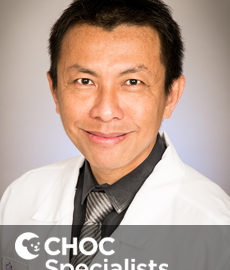
Tirakitsoontorn, Pornchai – MD
Pornchai Tirakitsoontorn, M.D. is a CHOC Specialist in Pulmonology board certified in Pediatric Pulmonology and General Pediatrics. Dr. Tirakitsoontorn is an Associate Clinical Professor in the Department of Pediatrics at UC Irvine.
Dr. Tirakitsoontorn served his fellowship in Pediatric Pulmonology at UC Irvine/Miller Children’s Hospital, Long Beach, California. He served as Chief Resident in Pediatrics and completed his resdiency training program at Seton Hall University, Jersey City Medical Center, Jersey City, New Jersey. Dr. Tirakitsoontorn received his doctorate at Chulalongkorn University, Bangkok, Thailand.
Prior to joining the CHOC Specialists, Dr. Tirakitsoontorn was an Associate Professor of Pediatrics at David Geffen School of Medicine at UCLA and Clinical Director of Pediatric Pulmonology Division at Mattel Children’s Hospital UCLA. Dr. Tirakitsoontorn was the Director of Pediatric Pulmonary Medicine at Cedars-Sinai Medical Center and attending physician at Bumrungrad International Hospital in Thailand.
Dr. Tirakitsoontorn’s research activities focus on the effect of exercise on growth, and cardiopulmonary function in patients with cystic fibrosis. His mission is to utilize exercise to the furthest extent as a therapeutic tool in helping them achieve a better quality of life and a longer life expectancy. Dr. Tirakitsoontorn has published a number of original articles and abstracts in peer-reviewed journals, including American Journal for Respiratory and Critical Care Medicine, Pediatric Research, Pediatric Pulmonology and The Federation of American Societies for Experimental Biology Journal.
Dr. Tirakitsoontorn performs the following specialty procedures, flexible larngoscopy, bronchoscopy and bronchoalveolar, pulmonary function test and sleep study interpretation. Dr. Tirakitsoontorn’s clinical interests include asthma, bronchopulmonary dysplasia (BPD), chronic cough, cystic fibrosis, and neuromuscular lung disease. Dr. Tirakitsoontorn speaks fluent English and Thai.
Dr. Tirakitsoontorn’s philosophy is to provide the best care possible to all his patients and watch them grow up healthy.
Publications
Publications† link:
Dr. Pornchai Tirakitsoontorn Publications
( † Disclaimer: This search is powered by Google Scholar. Google Scholar is a third-party website with no affiliation with CHOC.)
Arpan Global Charities Fundraiser Silent Auction & Wine Tasting – Saturday, November 12th, 2011
Arpan Global Charities Fundraiser Event Invitation:
Download the Arpan Global Charities Fundraiser Silent Auction & Wine Tasting Event Invitation PDF
Arpan Global Charities Donation/Sponsor Letter:
Arpan Global Charities Brochure:
Download the Arpan Global Charities Information Brochure PDF
Academic Day for Neonatologists of Southern California Conference Thursday, November 10th 2011
Download the Acacemic Day for Neonatologists of Southern California Conference Schedule PDF here:
Acacemic Day for Neonatologists of Southern California (ANOSC) Conference Schedule
For more information, please click the link below:
choc.org information on Acacemic Day for Neonatologists of Southern California (ANOSC) Conference
Grand Rounds Schedule – October – December 2011
Download the October – December Grand Rounds Schedule PDF here:
Grand Rounds Schedule ~ October – December 2011
Medicine 2.0
CHOC Walk in the Park – Sunday, October 16th, 2011
Event Details: CHOC Walk in the Park, Sunday, October 16th, 2011
Team PSF invites you to walk with us in the 21st annual CHOC Walk scheduled for Sunday, October 16th at Disneyland Park. Money raised from the CHOC Walk goes to support the Kids’ Care Fund, an unrestricted fund that is used to provide patient care and other high priority medical needs of children cared for by CHOC.
The CHOC Specialists staff, physicians and family members are walking together again this year in support of the children of CHOC. Last year our Team raised over $20,000 for the children at CHOC and was awarded first place for CHOC associate teams. We had over 100 PSF associates, physicians and family members walk as part of our Team. We encourage you to ask your family, friends and neighbors to walk with you and if they are unable to do so, please ask them to consider sponsoring your walk.
If you would like to walk with us, you may register at www.chocwalk.org under PSF Team.
If you are unable to walk, we would welcome your sponsorship of our team. Checks may be made payable to CHOC and are tax deductible.
Please contact Jackie Aleccia at 714.532.8644 for more information on becoming a walker or sponsor.
=======
On Sunday, October 16th, thousands of CHOC supporters will walk through the Disneyland® Resort at the 21st Annual CHOC Walk in the Park. Last year, over 14,000 participants raised over $2 million helping to support the care, services, education and research that CHOC provides children.
Now, every step means more. As CHOC expands the services provided throughout the community, your support will help more children – in addition to making sure that every child who is in need will receive care regardless of their family’s ability to pay.
Upon arriving at the Disneyland® Resort, you realize this is more than a visit to Disneyland®. It’s a celebration of the continuous support from our community. It’s a time for families to thank the doctors and nurses that cared for their children, and share their stories with other families.
As you walk through Disneyland® Park, Disney’s California AdventureÔ Park and Downtown Disney®, you’ll be joined by your favorite Disney friends – cheering you on and providing unique photo opportunities. You’ll have the exclusive opportunity to experience Disneyland® as you never have before!
At the end of the 5k Walk, the celebration continues in the Downtown Disney® District where event sponsors, hospital support groups, shops and restaurants have special offers for all Walk participants.
Club Corp Annual Charity Classic,Small Bites for Big Causes,Benefiting For OC Kids – Monday, October 10th, 2011
Small Bites for Big Causes Invitation Download:(click to download)
As part of Club Corp’s Annual Charity Classic, the fund-raising event will take place at the prestigious Center Club in Costa Mesa, which is opening its doors to the general public for this rare occasion. Featuring a spirited competition showcasing small plate fare from the finest local chefs, this anticipated event will also feature live entertainment and a silent auction in the elegant ambiance of the exclusive Center Club. All proceeds benefit MDA’s Augie’s Quest, For OC Kids Neurodevelopmental Center and ClubCorp’s Employee Partners Care Foundation.
Celebrity judges such as world-renowned food critic, author and television personality Simon Majumdar will be on hand during the competition to determine the finest cuisine of the evening. Select restaurants, wineries and chefs including Jenny Ross of 118 degrees, Stone Brewery Bistro, Cobblestone Winery and OneHope Wines have already committed to supporting this community-centered event. In addition, Center Club is pleased to announce award winning radio and television superstar Bubba Jackson as the official host of the event representing KJAZZ 88.1 FM.
According to Center Club General Manager Shahin Vosough, a variety of corporate sponsorship opportunities remain available. Contributions can also be made in the form of products or services for the auction or underwriting a specific portion of the event.
For more information and to purchase VIP or General Admission tickets, visit www.smallbitesforbigcauses.com or contact Shahin Vosough @ 714-662-3414.
Small Bites for Big Causes Donation Letter & Form(click to download)
=========
The Center Club, Costa Mesa(click for more info)
WHAT:
The Center Club is hosting a premiere charity event and spirited competition showcasing small plate fare from the finest local chefs and celebrity judges, such as world renowned food critic, author and TV personality, Simon Majumdar. This anticipated event will also feature lively music, refreshing cocktails and a silent auction in the elegant ambiance of the exclusive Center Club and be hosted by Bubba Jackson of KJAZZ 88.1 FM.
WHO:
Costa Mesa’s private Center Club looks forward to welcoming all foodies and those who enjoy tasting delicious bites, while serving their community and engaging the general public.
WHEN:
Monday, October 10, 2011
6:30 – 8:30 pm
*VIP reception begins at 5:30 p.m.
WHERE:
The Center Club located at 650 Town Center Drive in Costa Mesa
WHO BENEFITS?
All proceeds benefit MDA Augie’s Quest, For OC Kids Neurodevelopmental Center and ClubCorp’s Employee Partners Care Foundation.
TICKETS:
For more information and to purchase tickets, visit www.smallbitesforbigcauses.com or call 714.662.3414.
PRICING:
$100/guest
$150/guest to also attend VIP reception
=========
Meet the Judges:
Simon Majumdar
Best Selling Author, Food Critic, and TV Personality, Simon Majumdar has been selected as one of three returning judges for season three of Iron Chef America.
Cathy Thomas
Renowned author, Orange County Register Food Columnist, and Best Food Columnist in the nation from the Association of Food Journalists.
Christine Avanti
Nutrition consultant and author, Christine Avanti has been featured on numerous television shows including ABC’s Dancing with the Stars. Her expertise in nutrition has been sought after by Hollywood’s elite.
Mary Carrington
Community leader and philanthropist, Mary Carrington has supported the Arts in Orange County for over 25 years, holding executive responsibility on various boards: the Angels of the Segerstrom Performing Arts Center; the Visionaries of the Orange County Contemporary Art Museum; and South Coast Repertory Theater.
P.J. Ochlan
Midday host on K Mozart 1260 AM and heard regularly on K Jazz 88.1 FM, P.J. Ochlan is also the general manager of Cobblestone Vineyards, producing boutique wines from the company’s single vineyard family estates in Napa Valley, Monterey and New Zealand.
Ophthalmology Office – Orange
392 S. Glassell, Suite 100, Orange CA 92868
Hours by Specialty
- Ophthalmology: Monday-Friday, 9am to 5pm
Dr. Abdenur Leads Successful College of American Pathologists Survey of CHOC’s Metabolic Laboratory
On June 21st 2011, CAP (College of American Pathologists) arrived at CHOCs Metabolic Laboratory for the unannounced bi-annual survey. This survey is an all day process with an inspector reviewing our 300 standards. The inspector was quite impressed with the high complexity of the testing, as well as with the overall work and documentation performed in the lab.
Under the leadership of Dr. Jose Abdenur, Medical Director of Metabolic Disorders, and Metabolic Supervisor, Maree Burgess, PhD, the laboratory had a very successful survey!
The Director as well as the staff put in countless hours of preparation for the survey and assist in distinguishing CHOC as a Premier Childrens Hospital.
The entire staff is to be congratulated for a job well done!!
Conditions Library
Neurology Conditions Library
Evaluation of Global Developmental Delay
Febrile Seizure Guidelines for Community Physicians
Headaches in Children & Adolescents
Please note: All information is for educational purposes only. For specific medical advice, diagnoses, and treatment, consult your doctor.
CHOC Charity Dinner with Chef Roy Yamaguchi – Wednesday, August 31st, 2011
Click below for event details:
CHOC Charity Dinner with Chef Roy Yamaguchi, Wednesday, August 31st, 5 PM, 2011
CHOC is holding a fabulous event at Roy’s in Anaheim on August 31st. Roy Yamaguchi is preparing a 5 course meal along with two guest chefs. Kaena Wines and Santa Monica seafood are donating as well. This fantastic 5 course meal is only $85 and the proceeds benefit CHOC!
Guests can make reservation and mention CHOC for special reserved seating. Space is limited, so make your reservation today!
CHOC PSF Ophthalmology practice office moving – Thursday, September 1st, 2011
New Ophthalmology Map PDF Download Link
Dear Patients and Colleagues,
We are pleased to announce that our Ophthalmology practice is moving to a new office location, on Thursday, September 1st, 2011.
The address is:
Old Town Orange
392 South Glassell, Suite 100
Orange, CA 92866
Our phone and fax number will remain the same:
Phone: 714-509-2389
Fax: 714-509-2390
We look forward to seeing you at our new office.
Sincerely,
David A. Sami, M.D.
Division Chief, CHOC Specialists
Pediatric Ophthalmology & Adult Strabimus
CHOC Commerce Tower CHOC Specialists Cardiology Office
505 South Main Street, Suite 200, Orange CA 92868
Hours by Specialty
- Cardiology:
Monday-Friday: 8am to 5pm & Saturdays: 8:30am to 12:30pm
Dr. Anthony Chang and Dr. Ronald Bronicki published in Critical Care Medicine Journal: “Management of the postoperative pediatric cardiac surgical patient”
Critical Care Medicine Journal:
August 2011 – Volume 39 – Issue 8 – pp 1974-1984
Management of the postoperative pediatric cardiac surgical patient
Bronicki, Ronald A. MD; Chang, Anthony C. MD, MBASection Editor(s): Sevransky, Jonathan E. MD, MHS
Abstract:
Objective: To review the salient aspects and latest advances in the management of the postoperative pediatric cardiac patient.
Data Source: A Medline-based literature source.
Conclusion: The practice of pediatric cardiac intensive care has evolved considerably over the last several years. These efforts are the result of a collaborative effort from all subspecialties involved in the care of pediatric patients with congenital heart disease. Discoveries and innovations that are representative of this effort include the extension of cerebral oximetry from the operating room into the critical care setting; mechanical circulatory devices designed for pediatric patients; and surgery in very low birth weight neonates. Advances such as these impact postoperative management and make the field of pediatric cardiac intensive care an exciting, demanding, and evolving discipline, necessitating the ongoing commitment of various disciplines to pursue a greater understanding of disease processes and how to best go about treating them.
Dr. Diane Nugent honored with 2011 CalOptima Circle of Care Award
Please join the PSF in congratulating Dr. Diane Nugent on being honored with the 2011 CalOptima Circle of Care Award.
The CalOptima Circle of Care Award recognizes health care professionals, community groups and individuals who go above and beyond in the delivery of health care services to CalOptima members. Since the award’s inception in 2000, 172 recipients have been recognized by CalOptima for their extraordinary dedication to their members and community.
Hyundai Hope on Wheels 5K Race/Walk – Monday, September 5th, 2011
Join Hyundai Hope on Wheels to help raise awareness and funds for pediatric cancer research at the Hope on Wheels 5K Race/Walk, benefitting CHOC and held in the beautiful city of Rancho Santa Margarita! Children 9 and under can participate in the 5K at no cost, and following the event, participants can enjoy a Celebration of Life Family Fun Day, complete with face painting, carnival games, arts & crafts and more. Admission to the Family Fun Day is included with your race entry.
Event Details: Hyundai Hope on Wheels 5k Race/Walk
On May 10, Hyundai Motor America and its nonprofit organization, Hyundai Hope on Wheels, announced a $10 million gift to CHOC Children’s Hospital in Orange County, CA. The gift was the largest corporate gift in the hospital’s history, and will be used to fund groundbreaking pediatric cancer research, using the latest advances in genomic medicine to provide more effective, individualized treatment for children afflicted with this disease. CHOC Children’s is recognizing this gift by naming its cancer center of excellence the Hyundai Cancer Institute at CHOC Children’s.
Hyundai Hope on Wheels Homepage
Kids Help Children Benefiting CHOC – Sunday, August 14th, 2011
Event Details: Kids Help Children
Kids Help Children benefiting CHOC Children’s Hospital at the Hilton Anaheim is carnival, concert and fundraiser with a fun celebrity twist. Families gather friends and come to a unique and fun-packed Sunday afternoon!
Children will get autographs and pictures with their favorite stars and enjoy performances by Austin Anderson (Victorious), Savvy & Mandy (Radio Disney), 2-U-Neek (Radio Disney), performers from OCHSA and others! All children attending will get to pick a prize for themselves as well as one for a patient at CHOC.
Come experience this fun family event! See animals from SeaWorld up close and a real red carpet arrival. Enjoy balloon artists, bounce houses, refreshments, face painting, magicians, a rockin’ concert finale and lot of surprises!
Tour de Kids CHOC Classic – Saturday, August 13th, 2011
Join us for the second annual Tour de Kids CHOC Classic on Saturday, August 13th!
Event Details: Tour de Kids CHOC Classic
Patel, Shamin – MD
Bio coming soon!
Kenyota, Geoffrey – MD
Geoffrey Kenyota, M.D. is a CHOC Specialists Hospitalist who completed his residency training and currenlty serves as Chief Resident Liaison and Clinical Instructor at UC Irvine, California. He attended medical school at SUNY Downstate College of Medicine, Brooklyn, New York. He is currently a member of the American Academy of Pediatrics.


















